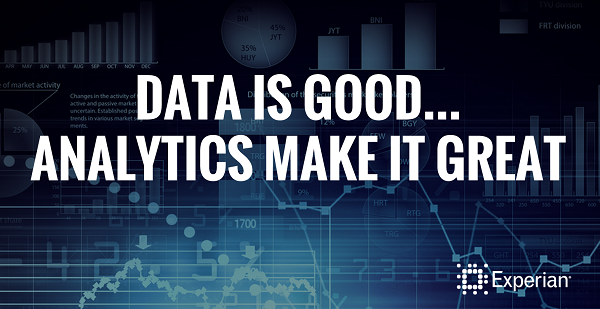Innovation
Insights from our Leaders

Experian hosting Future of Fraud and Identity event during National Cyber Security Awareness Month Costa Mesa, Calif., Oct. 13, 2014 — Identity and fraud concerns are a pressing global issue for many industries, including financial services, public sector and retailers. With the rise in security and data breaches, many organizations across the United States are particularly challenged, due to the growth of malware viruses, mobile-payment advancements and the need to authenticate online and mobile consumers better. To help business leaders address these rising fraud and identity issues, Experian® is hosting the Future of Fraud and Identity event on Oct. 21 in New York City, N.Y. The event will feature: Ori Eisen, Experian fraud expert and founder of 41st Parameter, highlighting the current trends in cybersecurity and how technology can combat these major threats Frank Abagnale, of Catch Me If You Can fame and respected authority on financial crime and fraud, sharing his personal story highlighting his work with numerous financial institutions over the past 38 years Charles Chung, president of Experian Decision Analytics, a global leader in fraud and identity products, opening the event Jon Jones, senior vice president of fraud and identity for Experian Decision Analytics, presenting Experian’s strategic view on identity risk management Many organizations are trying to address fraud risks while adapting to the changing habits of customers. One example of this is the acceptance of new mobile-payment options that are driving a transformation of the payments ecosystem. Current mobile-fraud trends include the use of increasingly sophisticated malware as attackers capitalize on banks and retailers providing these new service offerings to consumers via mobile devices. “Gaining control in this dynamic fraud environment is a major challenge for businesses as the Internet and mobile technologies were not designed with fraud in mind. Consumers accessing their financial or personal data at any time is a key fraud risk today, further enabling criminal activity,” said Eisen. “As companies invest to meet customer expectations and ensure that payments are secure and reliable, we see an urgent need for proactive next-generation security measures with fraud detection and intelligent device identification for corporate accounts and online transactions.” In 2013, identity theft affected more than 13 million U.S. consumers and accounted for more than $18 billion in losses. As technologies evolve and information security tightens, the savvy nature of fraudsters becomes more sophisticated. As a result, fraud management needs to evolve and include both offline and online fraud strategies to provide a panoramic view of the customer. In order to achieve this, authentication processes need to become seamless and straightforward to allow both the consumer and the business to feel confident in the authentication process while creating a positive customer experience. “Serious risks are emerging for consumers and businesses as fraudsters identify new targets to attack. The monetary cost of fraud losses can be high, but the impact a loss or breach can have on customer relationships and brand integrity can be even higher,” said Chung. “Combining comprehensive authentication processes with proportionate measures to monitor user activities and protect consumer data throughout the life cycle is a competitive requirement in today’s market.” The Future of Fraud and Identity event will take place on Oct. 21 in New York City, from 7:30 a.m. to noon at the Helen Mills Event Space at 137 West 26th Street.

 The power of data is good.
Couple it with analytics and it becomes great.
Derive real and tangible insight from this process, and you are left with a very potent tool to affect real change and do a lot of good in the process.
At Experian, we have deep experience harnessing the power of data, in fact, we have been doing it since 1897. Using our insights to help merchants and consumers by providing an annual credit reference directory, we were using “big data” before big data was a buzz word.
The power of data is good.
Couple it with analytics and it becomes great.
Derive real and tangible insight from this process, and you are left with a very potent tool to affect real change and do a lot of good in the process.
At Experian, we have deep experience harnessing the power of data, in fact, we have been doing it since 1897. Using our insights to help merchants and consumers by providing an annual credit reference directory, we were using “big data” before big data was a buzz word.

 Experian North America CEO Victor Nichols recently was recognized by the Consumer Credit Counseling Services of Orange County, California, as its 2014 Community Hero of the Year for his commitment to consumer financial literacy.
Mr. Nichols and Experian are proud to have been honored with this award. Experian has long been committed to consumer financial literacy and removing the mystery surrounding credit reports and scores, and that commitment has not wavered.
Experian North America CEO Victor Nichols recently was recognized by the Consumer Credit Counseling Services of Orange County, California, as its 2014 Community Hero of the Year for his commitment to consumer financial literacy.
Mr. Nichols and Experian are proud to have been honored with this award. Experian has long been committed to consumer financial literacy and removing the mystery surrounding credit reports and scores, and that commitment has not wavered.

Millions of Americans face economic hardships today due to the financial crisis. The Great Recession made a big impact on the financial lives of consumers. Unemployment was high and many struggled to make ends meet, forcing them to tap into their savings and live off credit to survive. Now that our economy is recovering, we believe that education is the key for consumers to unlock the door that leads to financial success and opportunity.

Consumers are can now be notified when their personal information is being used in an authentication transaction, allowing them to assess whether or not they recognize and expect their identity to be in review by a business. The service enables consumers to respond to the notification, and in cases of potential fraud, to be directed to seamless and effective resolution assistance.

 This week, Experian announced its collaboration with payment processor WilliamPaid, which provides renters in any type of property another option for having their rental payment data reported to Experian RentBureau.
WilliamPaid joins Experian’s growing list of rental payment processors, providing more opportunities and options for renters to have their on-time rental payments incorporated into their Experian credit reports. This is not only another step forward for people who are looking to build credit history, but it’s also an opportunity to build credit history for people who are referred to as “underbanked,” or “unscoreable”.
This week, Experian announced its collaboration with payment processor WilliamPaid, which provides renters in any type of property another option for having their rental payment data reported to Experian RentBureau.
WilliamPaid joins Experian’s growing list of rental payment processors, providing more opportunities and options for renters to have their on-time rental payments incorporated into their Experian credit reports. This is not only another step forward for people who are looking to build credit history, but it’s also an opportunity to build credit history for people who are referred to as “underbanked,” or “unscoreable”.

 Did you know that there are 64 million people in the United States that have little or no traditional credit history?
These people are typically referred to as underbanked or underserved consumers and Experian just announced Extended View Score that can help these consumers gain access to credit products and services, which can lead them down the path of building a fuller credit history.
Did you know that there are 64 million people in the United States that have little or no traditional credit history?
These people are typically referred to as underbanked or underserved consumers and Experian just announced Extended View Score that can help these consumers gain access to credit products and services, which can lead them down the path of building a fuller credit history.